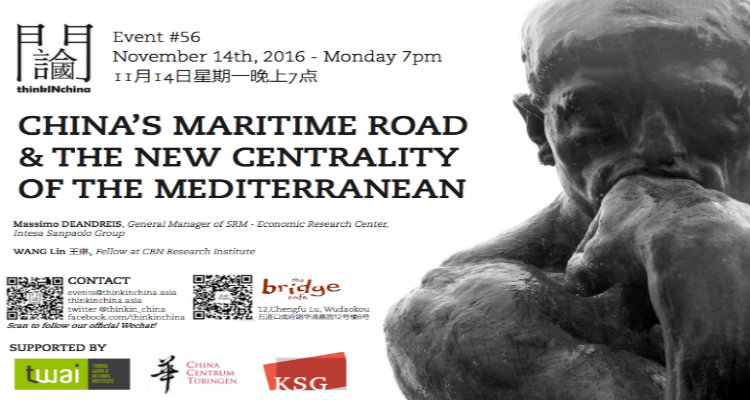ThinkINChina offers a chance to debate the future of this great country with senior Chinese academics and professionals in a rare intimate context.

Monday, November 14th, 2016 Massimo Deandreis (General Manager of SRM – Economic Research Center, Intesa San Paolo Group) and WANG Lin 王琳 (Fellow at CBN Research Institute) will talk about China’s Maritime Road & the new centrality of the Mediterranean.
ABSTRACT
This talk will explore China’s growing role in the Mediterranean and its potential impact on maritime geo-economics. Beginning with a review of the most pertinent data on the shipping industry and global maritime trade, the talk will analyze the significance of China’s involvement in the Mediterranean.
Reports on global trade to and from the Mediterranean and MENA (North Africa and Middle East) region demonstrates that there is a constant increase in the value and quantity of goods. China is the country with the most exponential increase in trade within this area: it passed from a global trade of 21.3 billion dollars in 2001 to 257.4 billion in 2015, and is forecasted to reach 283 billion by 2018. Moreover, with respect to the three main deep sea East-West shipping services, the Europe-Far East route has progressively gained traffic, raising its share from 27% in 1995 to 42% in 2015, while transpacific and transatlantic routes have lost traffic.
We can also observe a new centrality of the Mediterranean in maritime economy by looking at port data and markets trends. The southern Mediterranean ports (for example, Tangier in Morocco) are increasing in market share while the North European Ports’ market share are decreasing.
These trends should not be understood in isolation, but within the broader framework of global maritime trade. More specifically, four major maritime developments merit further emphasis and consideration: the inauguration of the New Suez Canal in 2015, which has enhanced Europe-Far East routes; the recent enlargement of the Panama Canal, which has pertinence for both North Atlantic ports and the Mediterranean; the naval gigantism trend, which affects routes and port logistics; and finally, the strengthening of alliances between major carriers, which reflects a significant evolution in shipping industries.
In all four of these maritime developments, China has global strategic interests and acts as a key player. The talk will expand upon each of these four points both from the Chinese perspective (especially in light of OBOR strategy) and from the Mediterranean perspective, while also taking into consideration recent Chinese investments in ports and logistics in the South Europe and MENA Region.
Learn more here.